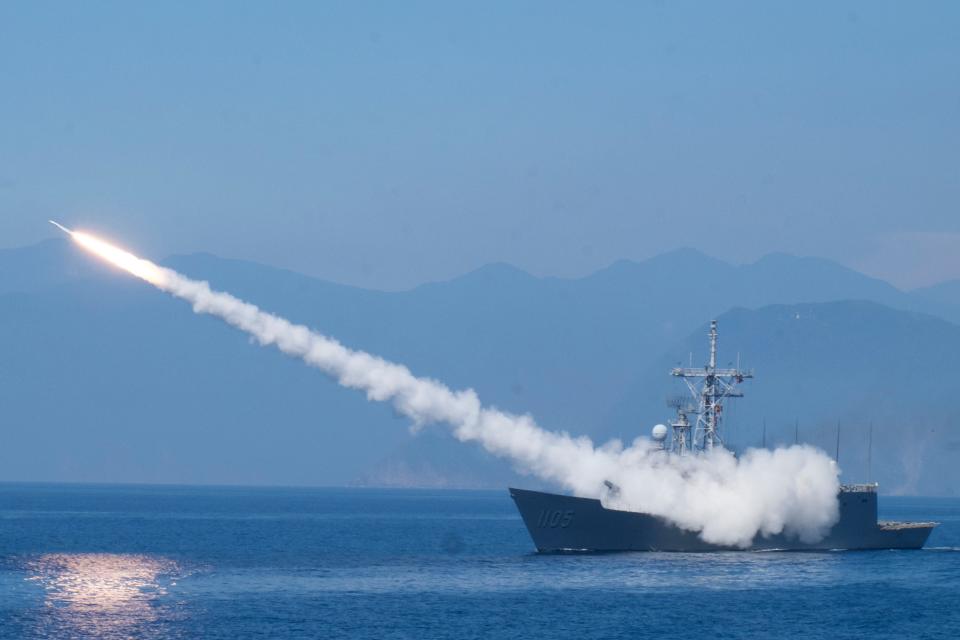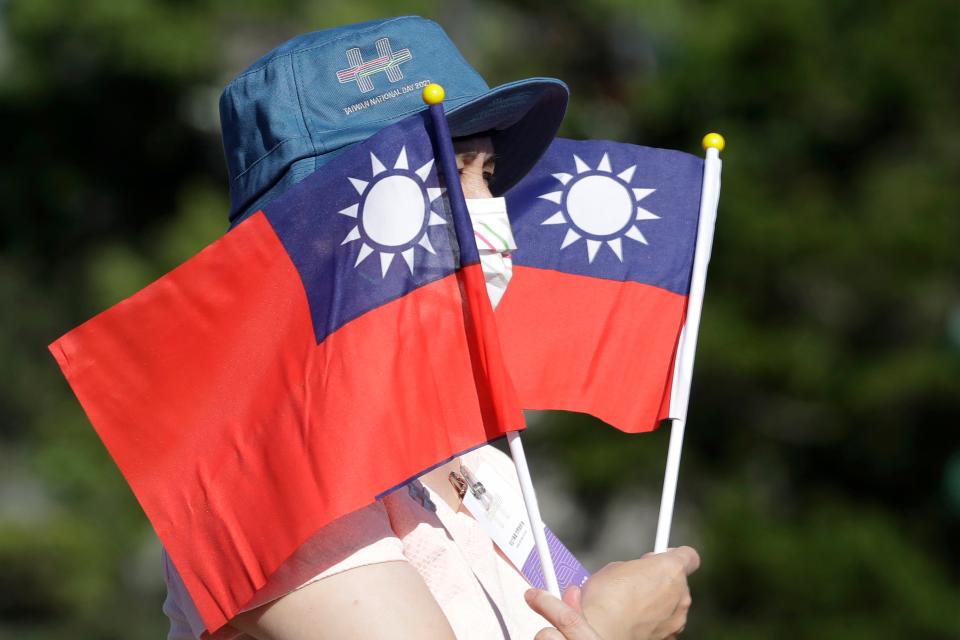Why Taiwan is the biggest flashpoint in the increasingly fraught US-China relationship
- Oops!Something went wrong.Please try again later.
- Oops!Something went wrong.Please try again later.
WASHINGTON – There’s no shortage of conflicts between the U.S. and China, a relationship that foreign policy analysts expect will define the 21st century. But an escalating confrontation over Taiwan is dialing up the tension.
A potential visit by House Speaker Nancy Pelosi to Taiwan comes as the U.S. has been sending new weapons to the self-governing island to help shore up its defenses against China’s increasing assertiveness toward what it views as a renegade province.
Pelosi's office on Sunday confirmed she's leading a congressional delegation to four stops in the Indo-Pacific region: Singapore, Malaysia, South Korea and Japan. Taiwan was not mentioned in the statement.
During his own trip to Asia in May, President Joe Biden said the U.S. has a military commitment to defend Taiwan.
China, which has been closely watching Russia’s invasion of Ukraine for possible lessons on how successful a move on Taiwan would be, has warned of “serious consequences” if the House speaker makes the trip.
Taking a tough line could help Chinese President Xi Jinping ahead of the Chinese Communist Party’s big meeting this fall where he hopes to secure an unprecedented third term.
The latest
Who's on the trip: Accompanying Pelosi are Rep. Gregory Meeks, D-N.Y. and chair of the House Foreign Affairs Committee; Rep. Mark Takano, D-Calif.; Rep. Suzan DelBene, D-Wash., Rep. Raja Krishnamoorthi, D-Ill., and Rep. Andy Kim, D-N.J., according to a press release from Pelosi's office on Sunday.
A top priority: Biden has been trying to counter the growing economic and military prowess of China, the only nation the administration views as capable of seriously disrupting the international system.
Strategic ambiguity? In May, Biden said he would authorize U.S. military help for Taiwan if China were to invade the self-governing island. That was the third time Biden had appeared to explicitly offer U.S. military protection for Taiwan only to have administration officials – or Biden himself – stress that the U.S. still supports the “One China” policy recognizing there is only one Chinese government.
Still talking: Attempting to keep the lines of communication open, Biden and Xi spoke by phone for three hours Thursday. China indicated that Taiwan was a significant topic of discussion during the call, with Xi reiterating the nation's firm opposition to independence.
What's in dispute: Taiwan is a self-governed island that China considers part of its territory. The U.S. has long tried to navigate a murky middle ground that aims to support Taiwan without provoking China.
Growing threat: China has dramatically increased its military capabilities in recent years. It now boasts the world's largest navy in terms of the number of ships, and it has formidable ballistic and cruise missile programs. In the past year, China has been sending large numbers of warplanes into Taiwan's air defense zone.

What's about to happen
Pelosi confirmed her travel plans on Sunday, but did not mention Taiwan. But other lawmakers have said they were invited to be part of a trip to Asia that would include a stop in Taiwan. Pelosi's trip could include a stop in Taiwan, according to the New York Times.
Pelosi, a staunch critic of China, said recently that it’s “important for us to show support for Taiwan.”
If she goes, she would be the highest-ranking elected U.S. official to visit Taiwan since then-Speaker Newt Gingrich went in 1997.
Biden has said the Pentagon doesn’t think a trip is a good idea. But administration officials have repeatedly emphasized the decision is Pelosi’s to make as the leader of a separate branch of the government.

Top takeaways
The Chinese Foreign Ministry spokesman in May called "the Taiwan question" the "most important and sensitive issue in China-US relations."
If Pelosi doesn’t go, it could look like the U.S. caved to Chinese pressure. If she does, it could trigger a crisis over Taiwan, some experts fear.
Chinese leaders have their own political calculations to weigh. Xi will be trying to bolster his own political standing ahead of an August meeting of top Chinese communists that comes before the fall’s 20th Party Congress.
Xi believes that reuniting China with what he views as its lost province of Taiwan will help cement his place in history, according to David Sacks, an Asia expert at the Council on Foreign Relations.
What they are saying
“The military thinks it’s not a good idea right now,” Biden said July 20.
“Chinese leaders must balance the imperative of asserting ownership with the imperative of avoiding catastrophic war. American leaders must balance the imperative of deterring invasion with the imperative of not provoking that invasion," wrote William H. Overholt, a China expert at Harvard's Kennedy School.
“A single spark could ignite this combustible situation into a crisis that escalates to military conflict. Nancy Pelosi’s visit to Taiwan could provide that," Asia experts Bonnie Glaser and Zack Cooper wrote in an op-ed for The New York Times.
"If the U.S. side insists on making the visit and challenges China’s red line, it will be met with resolute countermeasures," China's foreign ministry spokesman Zhao Lijian said Wednesday.

Why it matters
Biden has been trying to manage a relationship with China that he’s said is a competition, but “there is no reason there needs to be conflict.”
Beijing has rolled out the rhetorical firepower and implied that China could use military force as part of the “strong measures” it would take in response to a Pelosi visit to Taiwan.
White House spokesman John Kirby on Friday said the administration doesn’t “have any concrete indications of something happening from a military perspective on the Chinese part.” And he criticized China’s “bellicose rhetoric” as unhelpful and unnecessary since Biden emphasized to Xi in their call Thursday that “there’s been no change to American policy when it comes to Taiwan.”
Want to know more? Here's what you missed
Tension over Taiwan: Pelosi invites Republican lawmakers to Taiwan as China warns of countermeasures if speaker visits
Biden and Xi talk: The call focused on tension with Taiwan, economic anxiety
Easing tariffs?: Why Biden is still mulling whether to roll back Trump's China tariffs to fight inflation
This article originally appeared on USA TODAY: Pelosi's potential Taiwan trip shows flashpoint in US-China relations

